Scientific Publications of the Cologne Institute for Economic Research: IW-Trends, IW policy papers, IW-Analysen, IW-Studien, IW-Reports, IW-Kurzberichte and Expertises. Read more about our Approach to Research.
- Home
- Studies
Studies
- Anger, Christina
- Bach, Helena
- Bakalis, Dennis
- Bardt, Hubertus
- Bergmann, Knut
- Beznoska, Martin
- Bolwin, Lennart
- Burstedde, Alexander
- Busch, Berthold
- Bähr, Cornelius
- Büchel, Jan
- Decker, Mareike
- Demary, Markus
- Demary, Vera
- Deschermeier, Philipp
- Diermeier, Matthias
- Dietz, Annette
- Engels, Barbara
- Engler, Jan Felix
- Enste, Dominik H.
- Ewald, Johannes
- Fischer, Andreas
- Flake, Regina
- Fremerey, Melinda
- Geis-Thöne, Wido
- Gerards Iglesias, Simon
- Godesberg, Justina
- Goecke, Henry
- Grömling, Michael
- Haag, Maike
- Hafemann, Klaus
- Hammermann, Andrea
- Henger, Ralph
- Hentze, Tobias
- Hickmann, Helen
- Hünnemeyer, Vanessa Rebecca
- Hüther, Michael
- Jansen, Anika
- Kauder, Björn
- Kempermann, Hanno
- Kestermann, Christian
- Kirchhoff, Jasmina
- Kohlisch, Enno
- Kolev-Schaefer, Galina
- Koppel, Oliver
- Kremers, Corinna
- Kroke, Thorsten
- Kunath, Gero
- Kurtenacker, Andrea
- Körbel, Markus
- Küper, Malte
- Kürten, Louisa Marie
- Lang, Thorsten
- Lehr, Judith
- Lesch, Hagen
- Lichtenthäler, Sarah
- Malin, Lydia
- Matthes, Jürgen
- Mertens, Armin
- Metzler, Christoph
- Monsef, Roschan Pourkhataei
- Neligan, Adriana
- Niehues, Judith
- Oberst, Christian
- Obst, Thomas
- Parthie, Sandra
- Pierenkemper, Sarah
- Pimpertz, Jochen
- Plünnecke, Axel
- Pohl, Pauline Anna
- Potthoff, Jennifer
- Puls, Thomas
- Risius, Paula
- Rusche, Christian
- Röhl, Klaus-Heiner
- Sagner, Pekka
- Schaefer, Thilo
- Scheufen, Marc
- Schmitz, Edgar
- Schröder, Christoph
- Schumacher, Simon
- Schäfer, Holger
- Schüler, Ruth Maria
- Seele, Stefanie
- Seyda, Susanne
- Sommer, Julian
- Stettes, Oliver
- Stockhausen, Maximilian
- Suling, Lena
- Sultan, Samina
- Südekum, Jens
- Taft, Niklas Florian
- Tiedemann, Jurek
- Vahlhaus, Isabel
- Vogel, Markus
- Vogel, Sandra
- Voigtländer, Michael
- Wendt, Jan
- Werner, Dirk
- Wildner, Julia
- Wörndl, Daniel
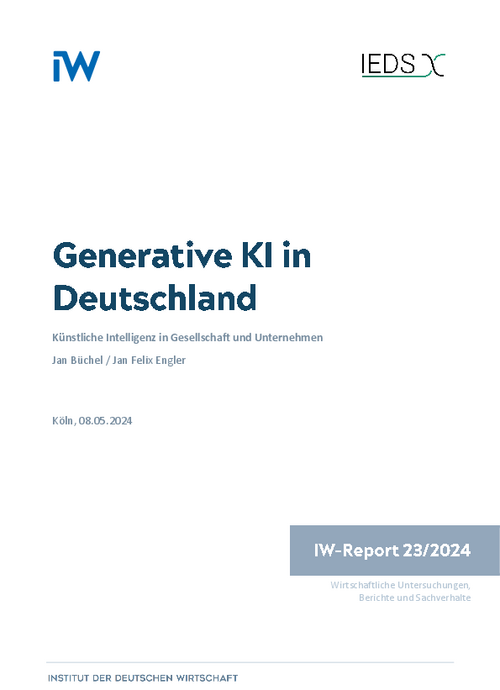
Generative AI in Germany: Artificial intelligence in society and companies
Generative AI has recently caused quite a stir. The reason is that generative AI applications can independently generate content such as texts, images, programming codes or videos that are often difficult to distinguish from human-generated content.
Jan Büchel / Jan Felix Engler IW
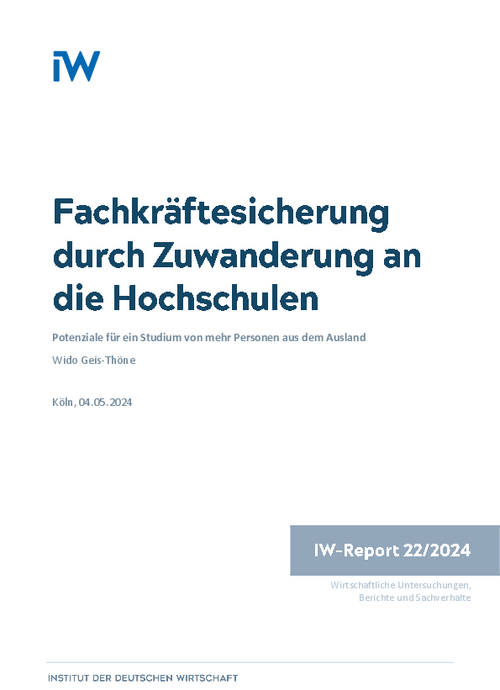
Securing skilled workers through immigration to universities
Against the backdrop of demographic change, Germany is increasingly dependent on skilled labour from abroad to secure growth and prosperity.
Wido Geis-Thöne IW
Open Science as a Means for Development Aid: Fostering Scientific Research and Innovation
Access to prior scientific works and technical information is key to the emergence of new scientific knowledge and innovation (Moser and Biasi 2018, Nagler et al. 2019).
*Alexander Cuntz / *Frank Mueller-Langer / *Alessio Muscarnera / *Prince C. Oguguo / Marc Scheufen IW
Access to science and innovation in the developing world
We examine the implications of lowering barriers to online access to scientific publications for science and innovation in developing countries.
*Alexander Cuntz / *Frank Mueller-Langer / *Alessio Muscarnera / *Prince C. Oguguo / Marc Scheufen IW
Financing the Sustainability Agenda
The EU has set legally binding targets for climate-neutrality by 2050. To succeed in the transition to a low-carbon economy, companies need to continuously develop new and improved climate-friendly technologies, and to adopt or move towards low-carbon business models.
Markus Demary / Adriana Neligan in Wilfried Martens Centre for European Studies IW
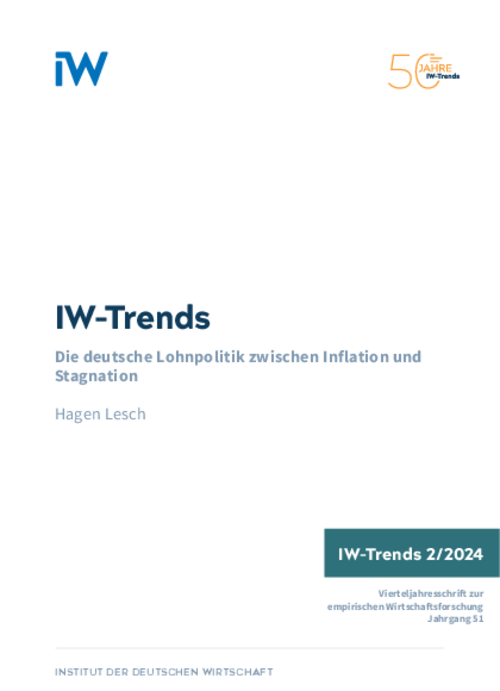
German Wage Policy between Inflation and Stagnation: Are Conflicts with the Aims of Monetary Policy Looming?
After the economic and financial crisis of 2008/9, the German labour market soon began to recover, creating scope for a comparatively expansive wage policy.
Hagen Lesch IW
Not so Different?: Dependency of the German and Italian Industry on China Intermediate Inputs
On average the German and Italian industry display a very similar intermediate input dependence on China, whether accounting for domestic inputs or not.
Samina Sultan at IEP@BU Policy Brief IW
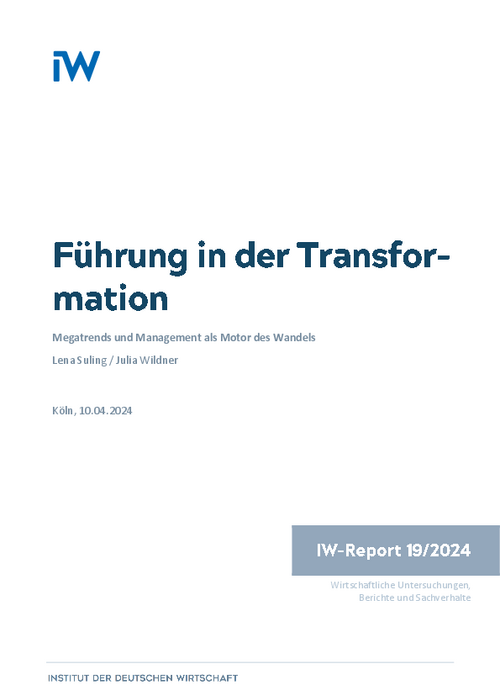
Leadership in transformation: Megatrends and management as a driver of change
Leadership dynamics in companies are subject to constant change in order to meet the challenges of their time. Today, the greatest influences result from developments such as demographic change, globalization, individualization, structural change and technologization in the economy.
Lena Suling / Julia Wildner IW
China’s Trade Surplus – Implications for the World and for Europe
China’s merchandise trade surplus has reached an all-time high and is likely to rise further. A key driver appears to be a policy push to further bolster Chinese domestic manufacturing production, implying the danger of significant overcapacities.
Jürgen Matthes in Intereconomics IW
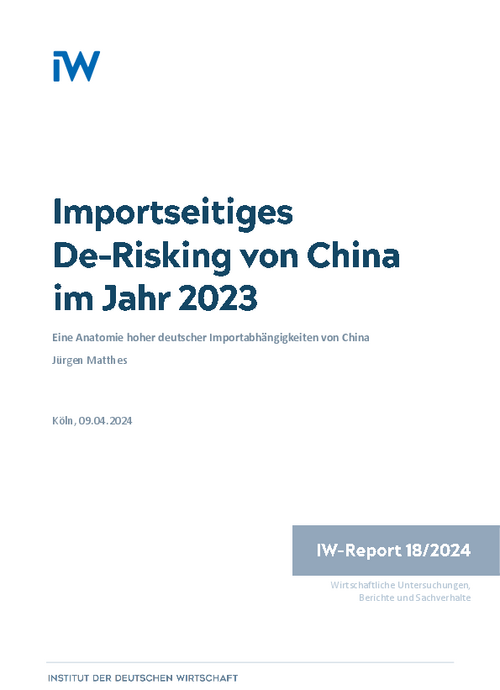
Import side De-risking China in 2023
Despite certain changes, German import dependencies on China remained at a similar level overall in 2023 as in the previous year in the overall picture. This means that de-risking on the import side can only be recognised to a limited extent.
Jürgen Matthes IW
Your search returned an incorrect status. You may have selected too many filters. You can jump back to your previous selection to adjust your search.
Understanding Science
- The scientific work of the German Economic Institute is independent and solution-oriented, internationally networked and socially relevant, methodologically open and interdisciplinary. We address the scientific discourse of experts, the general public as well as opinion leaders in politics, business and society. We want to be an audible voice in the economic policy discourse in Germany.
- Our work is innovative and confronts the scientific discourse: On the basis of scientifically recognized standards, we apply new methods, use new data sets, discuss new arguments and provide solution-oriented answers to current questions in economic analysis and economic policy. Our statements are theoretically founded and, where it is methodologically and empirically possible, evidence-based. We ensure that both the data basis and the methodological approaches are comprehensible. Modern methods of empirical economic and social research are as much a part of our tools as in-depth analyses of the institutional and political-economic conditions of economic developments.
- We do not exclude any theoretical and methodological approach, because diversity and competition promote progress in the sciences. The decisive factor is not a traditional paradigm, but whether and how a scientific approach leads further in the search for decision-guiding and action-relevant knowledge. Our research is not limited to economics, but is connectable to the debates and insights of other disciplines, such as ethics, history, education, political science, psychology, law, and sociology.
- Our research is aware of its normative conditionality. Every science of human social action requires a normative clarification of the concept of man. Freedom and (co-)responsibility are the central values for us. We see the human being as a being capable of freedom and responsibility, who in this sense is enabled and called upon to competent decisions and actions. In our view, open, liberal and democratic societies require a liberal and competitive economic order that counts personal responsibility and shared responsibility among its constitutive elements.
With our new newsletters on the following topics you no longer have an IW publication.
We send out our topic-specific newsletters every month.
Register here
With our new newsletters on the following topics you no longer have an IW publication.